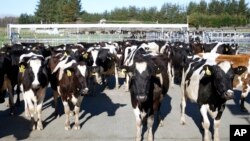New Zealand needs to transform its agricultural sector if the country is to meet its target of becoming carbon neutral by 2050, the nation’s new climate change minister said as world leaders met in Germany to try to tackle global warming.
James Shaw, leader of the country’s Green Party, said New Zealand was a developed country but had an emission profile of a developing country due to agriculture which accounted for nearly half of the country’s total greenhouse gas emissions in 2015.
New Zealand’s new Prime Minister Jacinda Ardern has made tackling climate change one of her top priorities and committed last month to erase the nation’s carbon footprint by 2050.
The 2050 target, supported by the Green Party, would put New Zealand in the vanguard of climate change with Norway aiming for net zero emission by 2030 and Sweden by 2045, both by buying international carbon credits and planting trees.
“It's really an economic transformation program that we’re embarking on in many ways,” Shaw told the Thomson Reuters Foundation on the sidelines of a meeting at the U.N. Food and Agriculture Organization on Saturday.
The new target came after a report released in March by the Paris-based Organization for Economic Cooperation and Development (OECD) warned New Zealand of environmental impacts from intensive dairy farming, road transport and industry.
For while the country only accounts for a small share of global emissions and generates 80 percent of its electricity from renewable sources, it has the second-highest level of emissions per GDP unit in the OECD, it said.
The Paris climate agreement set a goal of ending the fossil fuel era this century and to limit warming to “well below” two degrees Celsius (3.6 Fahrenheit) above pre-industrial times, ideally 1.5C.
Shaw said becoming a carbon neutral country was New Zealand’s “best contribution to being able to maintain global temperature rise to 1.5 degrees.”
He said to achieve its ambition, the new government was looking to establish a carbon budget system similar to the one overseen by Britain's Committee on Climate Change (CCC).
This system restricts the total amount of greenhouse gas emissions that the country can emit over certain periods, preparing reports for parliament on progress made.
He said New Zealand’s government was also interested in expanding research on how to increase profitability of land while decreasing emissions.





